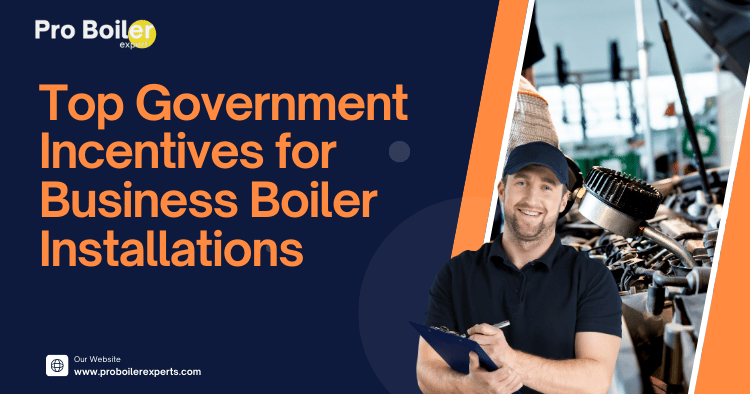Table of Contents
- Introduction
- Understanding Boiler Installations
- Types of Government Incentives
- Eligibility Criteria
- How to Apply for Incentives
- FAQs
- Conclusion
Introduction
In today’s competitive business landscape, energy efficiency is not just a buzzword; it’s a necessity. For businesses looking to upgrade their systems, government incentives for boiler installations can significantly ease the financial burden. Understanding these incentives can help you make informed decisions while enhancing your operational efficiency. Let’s explore the top government incentives available for businesses looking to install or upgrade boilers.
“Investing in energy efficiency is investing in the future of your business.”
Understanding Boiler Installations
Boilers are essential for numerous industries, providing heating and hot water needed for operations. Whether in manufacturing, hospitality, or healthcare, efficient boilers can lead to significant cost savings and lower carbon footprints. Installing a new boiler can be a considerable investment, but with various government incentives, the financial impact can be mitigated.
“Efficiency isn’t just a cost-saving measure; it’s a strategic advantage.”
Types of Government Incentives
Government incentives come in various forms, each designed to encourage businesses to invest in energy-efficient technologies. Here are the most common types of incentives available for boiler installations:
Tax Credits
Tax credits are a straightforward way to reduce your tax liability. Under programs like the Energy Policy Act (EPAct) and the Investment Tax Credit (ITC), businesses can receive substantial credits when installing energy-efficient boilers.
- EPAct allows businesses to claim tax deductions for energy-efficient property.
- ITC offers a tax credit for a percentage of the cost of qualified energy property.
For detailed information on tax incentives, visit the U.S. Department of Energy.
“Tax credits can substantially lower the cost of your new boiler investment!”
Grants and Rebates
Many state and local governments offer grants and rebates to businesses that invest in energy-efficient equipment. These funds can help cover the cost of purchasing and installing a new boiler.
For example, programs like the U.S. Environmental Protection Agency’s (EPA) Energy Star program provide rebates for energy-efficient upgrades. Check your state’s energy office or local utility company for specific programs. Additionally, consider exploring top 5 benefits of choosing a system boiler for your home for insights that could apply to your business context.
“Grants and rebates are like free money for making your business greener!”
Low-Interest Loans
Low-interest loans are another viable option for financing boiler installations. These loans typically have favorable terms and can help businesses manage upfront costs.
Programs such as the U.S. Small Business Administration (SBA) offer loans for energy efficiency improvements. Additionally, some states have their own loan programs aimed at fostering energy efficiency.
“Low-interest loans can turn a hefty investment into manageable monthly payments.”
Eligibility Criteria
Eligibility for government incentives can vary based on location and specific programs. However, common criteria include:
- Business Type: Many programs are available for small and medium-sized enterprises (SMEs) but may also cater to larger businesses.
- Boiler Specifications: To qualify, the boiler must meet certain efficiency standards. Check the specific requirements for each incentive.
- Installation Date: Some incentives require installation to occur within a specific timeframe.
Always verify the eligibility criteria for each program before proceeding.
“Understanding the eligibility criteria is crucial for maximizing your benefits.”
How to Apply for Incentives
Applying for government incentives can seem daunting, but it doesn’t have to be. Here’s a step-by-step process to simplify your application:
- Research Programs: Start by researching available incentives in your region. Websites like DSIRE provide comprehensive databases of state and federal incentives.
- Gather Documentation: Collect necessary documents, including purchase invoices, installation contracts, and any required certifications.
- Complete Application Forms: Fill out the application forms required for each incentive program. Many programs allow online submissions.
- Submit: Send in your application and keep copies of all submitted documents.
- Follow Up: Don’t hesitate to follow up with program administrators to check the status of your application.
“A well-prepared application can significantly speed up the process.”
FAQs
1. What types of boilers qualify for government incentives?
Most programs focus on high-efficiency boilers, including condensing and modulating boilers. Check specific program guidelines for detailed qualifications.
2. Can I combine different incentives for the same project?
Yes, it’s often possible to combine federal, state, and local incentives, maximizing your savings. Just ensure that you meet the eligibility criteria for each program.
3. How long does it take to receive incentives after applying?
The timeline varies by program, but it generally takes several weeks to a few months. Always check specific program guidelines.
4. What if my business doesn’t qualify for incentives?
If you don’t qualify, consider reaching out to energy efficiency consultants who can help you identify other financing options or ways to improve your efficiency. Also, check out resources such as top 5 benefits of conventional boilers for your home for alternative insights.
“Don’t lose hope; there are always alternative paths to efficiency.”
Conclusion
Investing in a new boiler can seem overwhelming, but with the myriad of government incentives available, it’s easier than ever for businesses to make the leap toward energy efficiency. By taking advantage of tax credits, grants, rebates, and low-interest loans, you can not only save money but also contribute to a more sustainable future.
If you are considering a boiler installation, don’t hesitate to explore the financial incentives available to you. Your wallet, and the environment, will thank you!
By understanding and leveraging these government incentives, you can ensure that your business is not only successful but also environmentally responsible. Happy boiler hunting!





